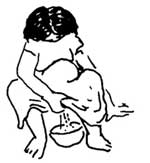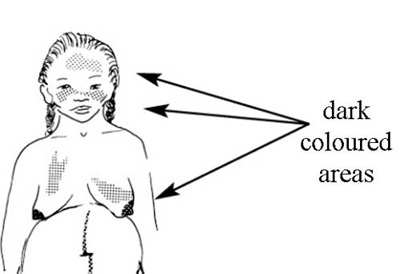Possible symptoms of pregnancy
The possible symptoms commonly reported by women in the early stages of pregnancy are sometimes also called 'presumptive signs' because pregnancy is often 'presumed' by the health professional on the basis of these subjective reports. But it is important to remember that they are only possible indicators of pregnancy.
Missing a menstrual period (amenorrhoea)
Amenorrhoea is pronounced 'ay men oh ree ah'.
Missing a menstrual period is often the first symptom that women notice when they become pregnant. If the woman tells you that she has missed a menstrual period (amenorrhoea), or stopped menstruating altogether for some months, it is a fairly good indicator of conception in women who usually have regular menstrual cycles. Other possible causes of amenorrhoea are poor nutrition, emotional troubles, or the menopause (change of life) in older women.
Breast changes

Pregnant women may report feelings of breast tenderness, fullness, tingling and enlargement and darkening of the areola (the darker circle of tissue around the nipple). During early pregnancy, the glands of the areola enlarge as a result of hormonal stimulation, and the breasts gradually get bigger to prepare to make milk for the baby. But note that breasts often get bigger just before the monthly menstruation in women who are not pregnant.
Nausea and vomiting
This common symptom occurs in approximately 50% of pregnancies during the first three months. It is usually most severe in the morning, which is why this feeling is often called morning sickness. But it can occur at any time and may be stimulated by cooking odours and spicy smells. Some pregnant women feel nauseous all day. Other possible causes of this symptom are illness or parasites. Severe, frequent vomiting is a danger symptom because the woman can lose weight rapidly.
Tiredness

Women in early pregnancy may report feeling tired and sleepy during the day, and wanting to rest more often than usual when doing their work. Other possible causes are anaemia, poor nutrition, emotional troubles, or too much heavy physical work.
Anaemia
Anaemia is a blood condition that can make a person feel tired all the time. The blood contains red cells which carry oxygen around the body, delivering it to the muscles and organs where they use it to make energy. A person with anaemia doesn't have enough red blood cells, so their body is short of oxygen and it can't make enough energy for normal activity. There are several causes of anaemia, but the most common is shortage of iron in the diet. Iron is needed to make new red blood cells. Anaemia causes problems in pregnancy and birth, but it can be prevented by eating enough foods with protein and iron in them. Pregnant women need a lot of iron so they are routinely given iron tablets.
Frequent urination

Pregnant women often report needing to urinate more frequently particularly during the first three months and the last one or two months of pregnancy. Other possible causes of this symptom are stress, a bladder infection, or diabetes (blood sugar disease).
Quickening
Most pregnant women start to feel their baby moving very lightly inside them before they are half-way through the pregnancy. This feeling is known as the baby 'quickening'. Women who have had a baby before are sensitive to these tiny movements sooner than women who are pregnant for the first time. The first perception of fetal movement usually occurs at 18–20 weeks of pregnancy in primigravidas (women who are pregnant for the first time), but it can be as early as 14–16 weeks in multigravidas (women who have had more than one pregnancy). Another possible cause of this symptom is gas in the belly.
Chloasma (or the 'mask of pregnancy')
Chloasma is pronounced 'klo az mah'.
Darkening of the skin over the forehead, bridge of the nose, or cheekbones, is called chloasma. It is most marked in women with dark complexions. Darker patches may also appear on the breast and the belly, especially along the mid-line below the navel. Signs of chloasma usually occur after 16 weeks gestation, (four months of pregnancy) and are intensified by exposure to sunlight, but these changes in the skin are not reliable indicators of pregnancy.

Could you conclude that a woman was definitely pregnant if she had all of the above symptoms?
You could not be certain that she is pregnant, because some normal bodily changes or health problems have the same manifestations as these possible symptoms of pregnancy.